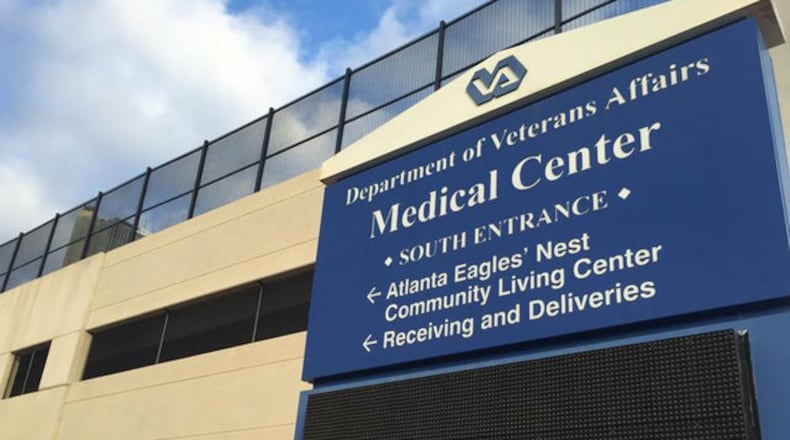The Veterans Hospital in Decatur was recently forced to dispose of thousands of dollars worth of unused heart stents, despite a 2019 federal audit warning that the facility’s mismanagement of its medical supplies was contributing to waste.
The audit says record keeping was so shoddy that it has been impossible to track which implants were being used. That could jeopardize patients, experts say.
The hospital discovered $122,000 worth of expired heart stents on its shelves in December, according to internal VA documents reviewed by The Atlanta Journal-Constitution. A year earlier, VA auditors discovered $52,000 in expired stents.
Those are “significant losses,” said Gene Schneller, a professor of supply chain management at Arizona State University. He added that the coronavirus pandemic caused slowdowns in medical procedures, which might have been a factor.
“But, under normal circumstances and times, they ought to be managing that demand and working with suppliers,” Schneller said.
Scheller said being unable to track implants could put patients in jeopardy, if an expired item is implanted. And failure to properly track which items are used could lead to problems if an implant gets recalled or if a patient needs follow-up, Schneller said.
In the earlier review, auditors found that VA employees from the warehouse to operating rooms failed to keep critical inventory records for implants or follow procedures and, at times, logistics supervisors told workers to not do their jobs reconciling or completing inventories. The auditors could not estimate the amount of inventory lost because of mismanagement because the records were in such shambles, the audit said.
The team of 17 auditors and support staff from the inspector general’s office scoured four VA hospitals’ shelves in 2019, searching for implants and records. In Atlanta, there were 807 biologic implants, such as heart valves and corneas, listed in the hospital’s records. Auditors could not find 362 — 45% — of them, says the report, which wasn’t released until Feb. 25 of this year. Auditors also found in storage 133 implants for which there were no records. The other hospitals also had poor records and mismanagement, the audit said.
Documents from this year and information from two Atlanta VA employees show the problems are continuing.
The Atlanta VA Health Care System in Decatur did not answer The Atlanta Journal-Constitution’s questions about the inventory issues.
Instead, the VA emailed a statement that says it takes seriously its mission to provide quality care to veterans and that it is complying with 11 recommendations from the Office of Inspector General. Among them, that the VA should clarify responsibilities and procedures, perform inventory reviews, and log transplants in a national database, as is required.
The hospital established workgroups to review how it orders and keeps track of implants and, in October installed commercial software to track them, the VA statement said.
“The increased oversight provided by this approach will mitigate the process issues and ensure that patients are tracked through the continuum of care,” the statement said.
But staff members still lose track of items, then, when they can’t find them, are forced to reorder, said an employee who has first-hand knowledge of the situation but asked not to be named because of fear of retaliation.
“They waste money,” the employee said.
The employee believes auditors uncovered only part of the problem. Protocols requiring workers to fill out paperwork on expired materials are not followed, so there is no record of their loss or disposal. Expired items — such as heart stents, which can cost $17,000 each — get thrown in trash bins
“Housekeeping doesn’t know. All they know is they are just taking out the trash,” the employee said.
Auditors found other supply management problems, such as doctors ordering five $3,340 implantable hearing aids for one patient, but using only one and not returning the others, and an oral surgeon using only 8 of 20 dental implants ordered for another patient.
Auditors estimated the total value of the expired or unaccounted for biological devices at the Atlanta hospital and two other facilities at $1.1 million. That number is likely understated because the records were so poorly kept, the audit said.
“It’s unfathomable what the number really is,” said a second VA employee in Atlanta who is familiar with the audit and ongoing problems.
The audit found that Atlanta VA logistics staff did not perform inventory reviews and instructed staff to not perform reconciliations of inventory. Atlanta’s deputy chief of logistics told auditors he was not surprised by the findings, and the chief of logistics told auditors that staff were following a draft operating policy, but no staff had seen or heard of the policy.
Two medical logistics experts with years of experience in working in hospitals told The Atlanta Journal-Constitution that medical centers are big, complex operations, but modern technology makes it easier to avoid lost inventory.
“We all know that these things happen when there are ways to mitigate or completely avoid the waste of potentially usable and critical to human survival supplies in our health care system,” Joel Sutherland, the managing director at the Practice Supply Chain Management Institute at the University of San Diego, wrote in an email.
Part of the problem is that health care providers tend to overstock to ensure inventory is available, he said. But there are highly automated inventory management systems that track and manage inventory efficiently — as long as those managing it do their jobs by properly entering inventory in the system, he wrote.
Schneller said that allowing medical materials to expire wastes money and time that could be used treating veterans.
“And that shouldn’t be happening,” he said.
About the Author
Keep Reading
The Latest
Featured

